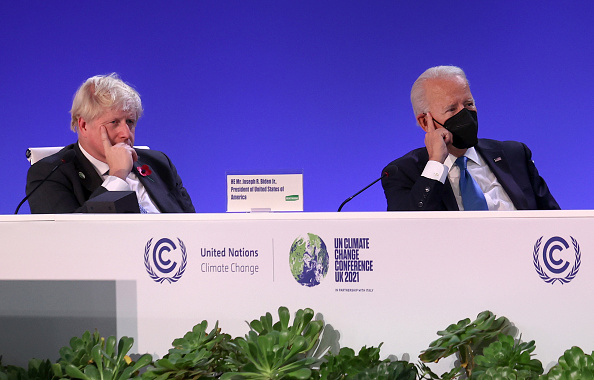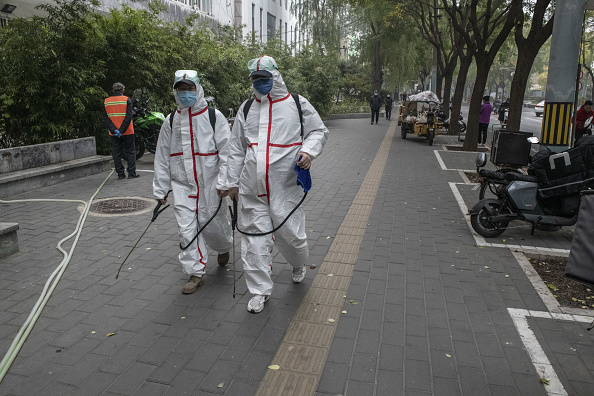
 A Green Rivalry
A Green RivalryThe eyes of the world are on Glasgow, Scotland, as the United Nations climate summit known as COP26 opened this week with UN diplomats and politicians alike calling for more action and new commitments to curb greenhouse emissions and adapt to the impacts of a warming planet.
Twenty-eight countries joined an international alliance dedicated to phasing out coal, but some of the biggest coal-dependent nations, including the United States and China, were not among them. Coal fuels over a third of the energy consumed worldwide, and is the single biggest contributor to climate change. China was responsible for about 54.3% of global coal consumption in 2020, whereas the United States, which also did not join the pledge, consumed 6.1%.
The United States and China did, however, join over 100 countries in a pledge to end deforestation by 2030, in a landmark agreement that encompasses some 85 percent of the world's forests.
President Joe Biden criticized President Xi Jinping for not showing up to the COP26 climate summit in person, saying that it was a "big mistake" that would damage Beijing's international standing. Beijing responded strongly, saying that the U.S. should look at its own record on climate action instead, citing the U.S. withdrawal from the Paris Agreement and its back-pedalling on climate policies.
 Going Nuclear
Going NuclearChina could have 700 deliverable nuclear warheads by 2027, and over 1,000 by 2030, an arsenal two-and-a-half times the size of what the Pentagon predicted only a year ago, according to a report published by the Pentagon this week. The nuclear arsenal is expanding much quicker than anticipated, narrowing the gap with the United States. China is also creating futuristic armaments that will operate in space and in the cyber realm, raising concern among Pentagon officials
In response to the report, Beijing issued a statement saying that the United States is responsible for bringing the world closer to nuclear war.
China's fast track strategy is considered by many to be born of worry over a potential attack from the United States. In the lead up to the 2020 election, then-Defense Secretary Mark Esper directed Joint Chiefs of Staff Chairman Gen. Mark Milley to make a reassuring phone call to his Chinese military counterpart.
Meanwhile, for the first time in 30 years China has proposed a measure on international arms control and disarmament issues in the UN, with the aim of upholding multilateralism, safeguarding world peace and promoting common development.
Read more in "The U.S. and China Are Not Destined for War," by Charles C. Krulak, Retired Four-star General and Former Commandant of the U.S. Marine Corps, and Alex Friedman, Former Chief Financial Officer of the Bill & Melinda Gates Foundation.
 Locking Down
Locking DownChina's latest wave of Covid-19 cases is continuing to spread, currently reaching 20 out of the 31 mainland provinces. While only 800 cases have been reported, this is the largest outbreak since the virus emerged in Wuhan in late 2019, and is considered significant for China, which remains the last country attempting zero-tolerance Covid-19 measures. This method, which aims to eliminate the virus completely within China's borders, implies that even just a few cases are viewed as a serious threat by Beijing. China's response to outbreaks has typically involved millions of residents from various cities placed in lockdown and tightened travel restrictions and quarantine measures for incoming travelers. This spike in cases of the Delta variant has seen intensified measures. Last Sunday, Shanghai Disneyland locked down after it was discovered that one potential park attendee had tested positive for Covid. Disney shut their gates and the 34,000 guests already in the park had to be tested before they could leave and be transported home for self-isolation.
The new spike in cases and intensified protection measures come just before a significant gathering between over 300 top-ranked members of the Chinese Communist Party early next week. Efforts to protect the capital have significantly increased ahead of the gathering, including the closing of multiple schools, the evacuation and quarantine of hundreds of passengers on a high-speed train heading into Beijing, and centralized quarantines with some residents being locked in their homes with contact-tracing censors outside their doors. A World Economic Forum event planned for later this month in Tianjin has also been canceled due to the near three-month high.
As cases continue to rise, the Commerce Ministry on Monday also urged local households to stock up on supplies they might need for the winter in case of emergencies. The announcement has raised concerns about China's ongoing supply shortages, unusually heavy rains and flooding, and Covid-19 outbreaks that might cause further lockdowns in the winter.
Read more in "Xi's Sincere New Messages," by Yu Sui, Professor at the China Center for Contemporary World Studies .
Prepared by China-US Focus editorial teams in Hong Kong and New York, this weekly newsletter offers you snap shots of latest trends and developments emerging from China every week, while adding a dose of historical perspective.
- 2021-10-29 Dry Tinder
- 2021-10-22 A Diplomatic Burn
- 2021-10-15 Energy Crunch
- 2021-10-08 Stoking Tensions
- 2021-10-01 Great Power Coopetition
- 2021-09-24 Sign of Goodwill?
- 2021-09-17 State of Play
- 2021-09-10 The Last Word
- 2021-09-03 Heightened Frustrations
- 2021-08-27 China’s Backyard
- 2021-08-20 Graveyard of Empires
- 2021-08-13 A New Crossroads
- 2021-08-06 Lowering Barriers
- 2021-07-30 A Diplomatic Stalemate
- 2021-07-23 A Climate for Change
- 2021-07-16 The Trade Game
- 2021-07-09 Existential Threats
- 2021-07-01 Centenary Celebrations
- 2021-06-25 Critical Crossroads
- 2021-06-18 Part of the Club
